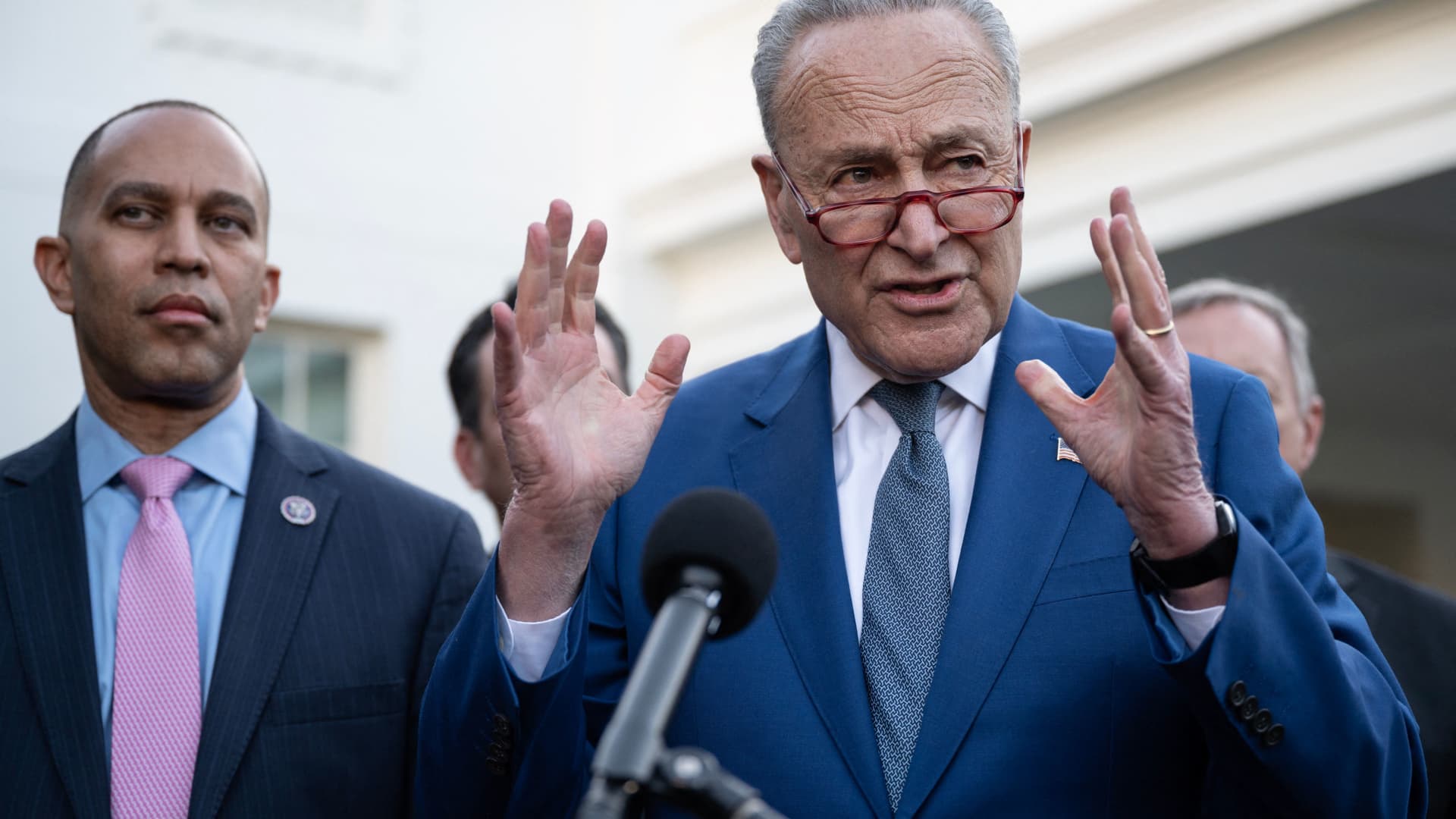WASHINGTON — Democrats responded to the news that the U.S. could default on its debt as early as June 1 by hardening their public positions, accusing Republicans of holding the nation’s economic welfare hostage to demands for federal budget cuts.
But behind the scenes, President Joe Biden, Senate Majority Leader Chuck Schumer and House Democratic Leader Hakeem Jeffries have all taken steps in the past day that could pave the way for an 11th hour deal with a small group of Republicans to avert a default, by raising or suspending the nation’s debt limit.
related investing news
The moves underscore a growing disconnect between the political rhetoric of the debt ceiling debate and the private reality of a potentially catastrophic U.S. default that now appears closer than it did just 24 hours ago.
The White House insisted Tuesday that Biden will not use a meeting he set up with congressional leaders for May 9 to negotiate over the debt ceiling. “He’s going to make it very clear how it is Congress’s constitutional duty to act,” said White House press secretary Karine Jean-Pierre. “He is not going to negotiate on the debt ceiling, that is not going to change.”
But the very fact that Biden is meeting with House Speaker Kevin McCarthy at all, however, signals a significant change. It comes after months of Biden and the White House demanding that McCarthy produce a Republican budget and agree to take debt default off the table, neither of which the speaker has done.
Schumer’s maneuvers
In the Senate, where Democrats have the majority, Schumer ripped a bill House Republicans passed last week. The measure would raise the debt ceiling in exchange for massive cuts to discretionary federal spending. It squeezed through the slim GOP-majority House despite opposition from every Democrat and four Republicans.
Schumer said the Republican bill “would tear at the fabric of American society, impose dramatic cuts to our public security and cut law enforcement dramatically at a time when we need help from them.” He argued that it would result in the “abandonment of veterans [and] terrible job losses.”
Yet moments before Schumer delivered his scathing condemnation of the House GOP bill, he entered that same bill onto the Senate calendar under a special rule that allows it to bypass the Senate committee process and move right to the floor for consideration.
Schumer also moved a separate piece of legislation to the floor – a Democratic bill to suspend the debt limit through Dec. 31, 2024.
There are two ways for Congress to avoid a looming debt default: The first is by voting to raise the statutory debt limit, currently set at $31.4 trillion. The second is by voting to suspend the limit for a set amount of time, essentially stopping the clock on default.
For House and Senate Republicans who have promised constituents they will not vote to raise the debt limit without first securing major concessions from Democrats on spending, the option of voting to suspend the debt limit could offer them some room to maneuver without breaking their pledge to voters.
Later in the day, Schumer told reporters that after the Senate passed a so-called “clean” debt ceiling suspension bill, “then we could use [the House GOP bill) for a proper discussion of the appropriations and budget process.”
Jeffries and McConnell weigh in
As Democrats explored their options, Republicans were largely muted on Tuesday. When Senate Minority Leader Mitch McConnell spoke on the Senate floor immediately after Schumer, he did not mention the debt ceiling.
He later insisted that any negotiations must take place between McCarthy and Biden. “The ultimate solution will be between the Republican House and the president, and the sooner the president and the speaker get about it, the better off the country will be,” McConnell told reporters at a press briefing.
On the House side, plans were also in motion Tuesday to begin work on a way for Democrats to move a bill to raise the debt limit to the floor without the support of GOP majority leadership using a legislative vehicle known as a discharge petition.
Specifically, Jeffries said in a letter to his Democratic colleagues that Rep. Jim McGovern, D-Mass., “just filed a special rule that would allow for Floor consideration of a bipartisan measure to avoid a dangerous default.”
“The filing of a debt ceiling measure to be brought up on the discharge calendar preserves an important option,” wrote Jeffries.
A Democratic discharge petition would still face major hurdles, starting with challenge of convincing at least a half dozen House Republicans to abandon to dramatically cross the aisle to vote for a Democratic bill. If it were to pass the House, any bill would then face the 60-vote filibuster threshold in the Senate.
Senate math will be further complicated by the ongoing absence of California Democrat Dianne Feinstein, who has been away from Washington since February on a medical absence, with no immediate plans to return.


